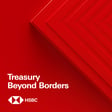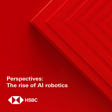
HSBC’s Sibos Spotlight: The Future of Custody – Discovering the MarketSpace ecosystem
In the first episode of our podcast mini-series, TMI's Eleanor Hill is joined by Alexis Vasquez Meissner, Suman Bhadresha and Stephen Man to discuss the latest trends in the custody arena. They discuss HSBC’s overarching vision for the future of custody, and how our markets & securities services platform, MarketSpace, will connect the industry for clients through one single access ecosystem.
This is HSBC’s Sibos Spotlight, a podcast mini-series in collaboration with Treasury Management International (TMI). Throughout this series we will explore the critical topics impacting the transaction banking landscape, specifically looking at sustainability, digitisation and innovation. We will examine the opportunities and challenges disrupting the areas of payments, trade, custody and traditional business models.
To find out more about HSBC's transaction banking insights and presence at Sibos 2022, visit here.
Hosted on Acast. See acast.com/privacy for more information.
















